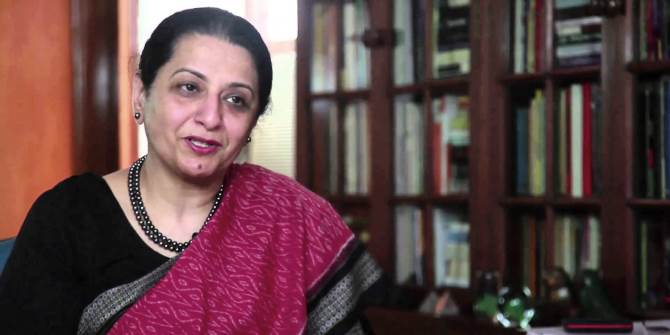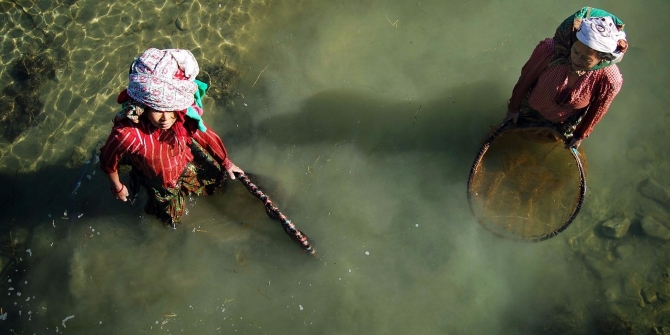 On 11 February the LSESU Nepalese Society hosted an expert panel to discuss Nepal’s long-awaited new Constitution, and to explore where the Himalayan nation is likely to go from here. Sangita Thebe Limbu, who chaired the event, offers an overview of the insights provided by Professor Michael Hutt, Dr Mara Malagodi, Dr Punam Yadav and Dr Chandra Laksamba.
On 11 February the LSESU Nepalese Society hosted an expert panel to discuss Nepal’s long-awaited new Constitution, and to explore where the Himalayan nation is likely to go from here. Sangita Thebe Limbu, who chaired the event, offers an overview of the insights provided by Professor Michael Hutt, Dr Mara Malagodi, Dr Punam Yadav and Dr Chandra Laksamba.
In April and May 2015, Nepal was struck by two major earthquakes that killed nearly 9,000 people and left millions in need of aid. As the country was reeling from the devastating effects with continued tremors of aftershocks, a new Constitution was promulgated by the Constituent Assembly on 20th September 2015. The seventh new Constitution of Nepal, which came after a ten year civil war followed by seven years of political wrangling, was met with mixed reactions. The general sense of euphoria and relief was short-lived as widespread protests erupted in Terai, the southern region of Nepal, subsequently resulting in an ‘unofficial’ economic blockade by India, which disrupted relief efforts and brought Nepal’s already fragile economy to standstill. After five months, the blockade was lifted in early February this year.
For Nepal, it has certainly been a challenging start to 2016. Moving forward, the question is not only about how to deal with the compounded consequences of earthquakes and the recent economic blockade, but also how to resolve the disputes around restructuring of the state and political representation, and how to achieve political stability amidst rising identity politics? What role does the new Constitution play towards resolution of ongoing political conflicts? What does the new Constitution mean for Nepalese living within Nepal, and also the Nepali diaspora more broadly?
To discuss these questions and more, LSESU Nepalese Society organised a round table discussion on the topic of ‘Nepal After the Constitution’ as part of their 2nd annual Nepali Aawaz conference on 11 February. The panellists included Professor Michael Hutt from SOAS, Dr Mara Malagodi from the City Law School, Dr Punam Yadav from LSE and Dr Chandra Laksamba from Centre for Nepal Studies UK, who delved into analysis of the new Constitution, its relationship with 2015 earthquakes and recent political events in Nepal along with prediction of future developments.

The relationship between the 2015 earthquakes and the new Constitution:
The National Reconstruction Authority (NRA), the central body responsible for reconstruction of quake-destroyed houses and infrastructures, took nine months to set up following the earthquakes that affected over 9.3 million people. However, the Constitution that had been stalled for so long materialised within five months. Professor Michael Hutt drew upon this expedited Constitution promulgation process in the aftermath of the earthquakes and analysed the wider impacts of such large scale natural disasters on the social and political grammar of the society.
Professor Hutt argued that the earthquake provided a kind of ‘full stop’ to a number of political discourses and created a distraction, which led to series of political events that have resulted in an even greater disenchantment of the Nepali public with its government. Political leaders were aware that the earthquakes would be followed by a major influx of international fund for reconstruction and rehabilitation so in order to establish a political structure for distribution of resources among political forces the Constitution was clearly prioritised over the establishment of NRA.
Professor Hutt further suggested that if Nepal had not suffered the earthquake, it might not yet have a Constitution or if it did have a Constitution it is likely that it would have been drafted in a way that honoured more carefully the past commitments to greater inclusivity and restructuring of the state.
Changes and continuities in the new Constitution
Since its inception, the new Constitution has proven controversial yet it will still play a decisive role in determining the political structure of Nepal which will also have wider social and economic repercussions. Dr Mara Malagodi provided an analysis of the new Constitution focussing both on the legal text and the political process that accompanied its formulation. Dr Malagodi commented that although the Constituent Assembly was an outcome of a democratic process and was intended to be a forum for discussions, some of the key decisions were taken behind closed doors by dominant political party leaders. This lack of transparency in decision making process is reflected in the outcomes whereby the Constitution has proven controversial, particularly in relation to the questions of federalism and demarcation of units based on identities, political representation, and citizenship laws.
Based on her reading of the legal text, Dr Malagodi concluded that the new Constitution is ‘ambiguous with a number of tensions within the texts’. For instance, there are progressive clauses such as LGBT rights, but at the same time the Constitution uses gender language to outline citizenship laws, which is problematic. There is also discrepancy around secularism, whereby Article 4 declares Nepal as a secular state yet goes on to define secular as religion and culture practised since ‘Sanātana’, which clearly implies Hinduism. There is also a ban on religious conversion.
Dr Malagodi argued that in the new Constitution a certain vision of identity of the state was being promoted, which was similar to the 1990 Constitution rather than the more progressive interim 2007 Constitution. Looking at the arch between 1990, 2007 and 2015 Constitutions, Dr Malagodi commented that even though Nepal has been declared as a republic and a secular state, there has been a degree of reverting to 1990 framework, along with many more continuities.
Discriminatory citizenship laws
One of the continuities present in the new Constitution is certainly the discriminatory citizenship laws, which is regressive in comparison to the provisions of 2007 Interim Constitution. Dr Punam Yadav provided an analysis of how the new Constitution discriminates against Nepali women by denying them citizenship rights on equal terms to Nepali men. Dr Yadav argued that the new Constitution, which replaces ‘and’ with ‘or’ in Article 11.2.b (i.e. a person whose father or mother is Nepali at the time of the birth can become Nepali by descent) does little for women as the citizenship provision still discriminates against Nepali women marrying foreign nationals. Furthermore, there is no provision of naturalised citizenship for foreign spouse of Nepali women. The Constitution also does not talk about same sex relationships and children born out of such relationships.
Dr Yadav commented that such discriminatory citizenship laws are a contravention to the international agreements such as CEDAW and have a wider impact on society and not just on women. Dr Yadav argued that these discriminatory provisions which have come about in response to Nepal-India relationship and subsequent issues with cross-border migration should be dealt differently and ‘not by using women’s bodies to achieve political aims’.
Future of Nepal
Political transitions have been a characteristic feature of contemporary Nepali politics whilst the economic transformation and social justice remain long overdue. In this context, Dr Chandra Laksamba argued that Nepal’s development has been inhibited by not only its geopolitics but also customary norms and values. Dr Laksamba further commented that the rising identity politics and regional conflicts run the risk of fragmenting the country, which is why it is important for Nepalese to find common grounds and move ahead as a unified entity.
In order to ‘deconstruct’ the prevailing mentality of the older generation and open up new perspectives and possibilities, Dr Laksamba emphasised the important roles that youths living both in and outside Nepal can play. Commenting on the Non-residential Nepalese (NRN) citizenship provisions outlined in the new Constitution, which grants social and economic rights to NRN (Article 14), Dr Laksamba commented it was a positive step that will enable Nepalese living outside Nepal to contribute positively to Nepal’s development through utilisation of their acquired skills and knowledge.
In conclusion, the crucial question remains – is Nepal moving towards stability and economic prosperity? Or is it heading towards another round of political conflict? All four panellists were cautious in their responses – Professor Hutt commented that a dangerous rift has opened up between Pahad (hills) and Madhes (plains) and the Pahad need to show greater understanding than it currently does. Dr Yadav emphasised the need to understand the voices of dissent that have been silenced and marginalised in the past better. Dr Malagodi stated that it’s a critical moment for Nepal; however, the first amendment to the Constitution should be seen as a positive step towards political dialogues which will foster positive developments. Dr Laksamba concluded that national unity is the only way forward.
Click here to view the full podcast of the 2nd annual Nepali Aawaz (i.e. Nepali Voices) event, which was funded by the LSE Annual Fund.
Note: This article gives the views of the author, and not the position of the South Asia @ LSE blog, nor of the London School of Economics. Please read our comments policy before posting.
About the Author
 Sangita Thebe Limbu is studying Gender, Development and Globalisation at the London School of Economics and Political Science (LSE)
Sangita Thebe Limbu is studying Gender, Development and Globalisation at the London School of Economics and Political Science (LSE)







